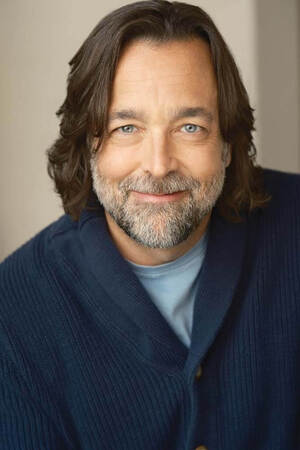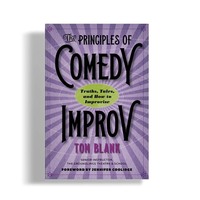
Improv’s famous “Yes, and . . . ” mantra demands performers stay in the moment and build on their partners’ moves, however the unscripted scene plays out. Tom Blank ’91 may not have realized it during the journey, but his formerly peripatetic life was preparing him for his future career as an improvisational performer, instructor and, now, author of The Principles of Comedy Improv: Truths, Tales, and How to Improvise.
Before moving into Zahm Hall as a freshman, Blank had lived in Canfield, Ohio; Wheaton, Illinois; and Buffalo, New York. After graduating as a mechanical engineer, he spent the next decade in Seattle working for aerospace giant Boeing, spending his nights notching an MBA from Seattle University and an associate degree from The Art Institute of Seattle. He jumped to different dot-coms before the internet bubble burst, then pivoted back to aerospace, taking a contract gig in Jamestown, North Dakota. There, he fell for a Roughrider State native and followed her to Southern California.
While that relationship ended, Blank’s time in Los Angeles did not. He held administrative positions in construction and waste management.
Trying to carve out a social life in L.A., Blank took improv classes at the legendary Groundlings Theatre, which he knew about from an article about the death of comedian Phil Hartman. There Blank stepped on stage for the first time since the Zahm talent show, where he had delivered just a single line of dialogue.
Though he found improv interesting, challenging and highly social, he questioned if it was for him: “What is the point?” Then, on a Wednesday night in 2005, ready to quit, he attended his first longform improv event: The Crazy Uncle Joe Show at the Groundlings. The experience was revelatory. “I felt what I think a crack addict feels,” he says. “I wanted to inject that stuff right into my veins.”
He got serious about the art, branching out to the different theaters and schools in Los Angeles. Improv suited him, allowing him to draw on his unusually wide variety of work and life experiences. As he writes in The Principles, “Your mind is bursting with junk; time to use it.”

The first-time author did not intend to write a book. Over lunch in Los Feliz, California, the longest home base of his life, he explained that the simple act of taking notes after every class grew into stacks and stacks of papers. Organizing and refining those ideas over time was useful to his own understanding and ultimately changed his teaching. In writing the book, his engineering background demanded elaborate outlines and walls covered with color-coded 3-by-5 cards. “My process ended up on paper.”
Having found a living as a teacher and voiceover artist — gamers may have heard him on Call of Duty and Horizon Zero Dawn — Blank set out to get published without an agent. He pitched (and polished and repolished) the manuscript for two years, finally landing at the prestigious University of Iowa Press. He shows no bitterness over the grueling wait, though. He leaned on the bedrock of “Yes, and . . .” As he explains in the book, “It’s the comma that symbolizes a pause. It is in that pause that we do work. The work is silent. It takes digging. It is an adventure.”
His patience was rewarded, as the gap permitted actress Jennifer Coolidge time to write the book’s foreword. (Ah, yes, Hollywood!) On stage, Blank has “played with” — as they say in the biz — Saturday Night Live cast members and Oscar- and Emmy Award-winning writers. But the name friends and family get most excited about is not even a real person: “Flo” from the Progressive Insurance commercials, played by Groundlings alum Stephanie Courtney.
Like that ad campaign, Blank’s book shines with funny scenes. If comedian Martin Short, psychology pioneer Carl Jung and Winnie-the-Pooh creator A.A. Milne had co-written a textbook, it would read a lot like The Principles of Comedy Improv.
The book makes clear that improvisational theatre is far more structured and defined than most civilians would ever realize. “I originally hoped this could be a ‘toilet book,’” Blank admits, but it is a lot more than a pithy read on the john. Part Two alone contains six chapters exploring what happens in a single moment of an improv scene.
To illustrate the technical points while keeping the reader’s attention, Blank uses everyday examples as well as off-the-wall ones, such as the first Egyptian to add a back door to his pyramid. I could hear Short’s voice explaining to neighbors the structure was altered to provide “an easier way to get to the backyard.” Blank elaborates: “Innovation became the rage, leading to developments like doggy doors . . . heated roofs . . . and afterlife transitioning.”
For the book-skimmers among us, each chapter ends with a helpful “Wrap It Up” summary, like CliffsNotes for would-be comedians. But you don’t need a burning desire to elicit laughs on stage to glean insights. Improv’s principles echo philosophy and children’s literature and hold healthy applications to everyday life. Jung’s theory of “individuation,” that everyone is on a quest to integrate the different and often unconscious or rejected parts of our psyches into one, surfaces in Blank’s writing: “We say we are playing a character, but it is more accurate to say we are playing a part of ourselves. It is all you.”
The author acknowledges that real-life responsibilities can keep us from remembering to enjoy ourselves. Channeling Milne, he writes, “Luckily, fun never forgets us.”
Yes, and . . .
Jamie Reidy is an author and screenwriter. He lives in Palm Springs, California, with his wife and two cats that she did not happen to mention in her profile on the dating app.